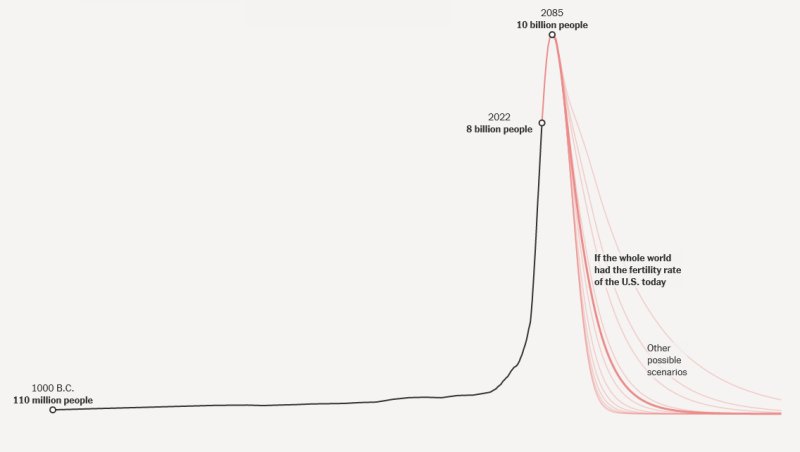- False Memories and the Narrative Bias;
- Another piece with Lee McIntyre about misinformation vs. disinformation;
- And how the world’s population will likely peak by the end of this century, and then drop;
- And my thoughts on what the consequences would be if the world’s population were greatly reduced.

Big Think, Ross Pomeroy, 19 Sep 2023: Study reveals a big driver of false memories, subtitled “We are prone to false memories. One reason is that we are biased toward remembering tidy endings for events, even if they didn’t exist.”
It’s long been known that memory is fallible. We remember remembering, retelling incidents to ourselves each time, and each time we remember the fidelity drops; and we retell events, unconsciously, to favor ourselves, or to simplify situation one didn’t actually entirely understand at the time. It’s in this last sense that the piece here connects false memories to the narrative bias.
Key Takeaways
• A key driver of false memories is the brain’s bias to recall events in ways that conform to what usually happens. Thus, we can misremember events that don’t fit with how the brain expects them to play out. • In a new study, researchers tested whether subjects would form more false memories about a storyline that doesn’t follow a typical beginning-middle-end structure. • Their hypothesis was correct. When trying to remember video clips without a clear conclusion, subjects would unknowingly fabricate one.
This is a good way of putting it:
False memories arise because the human brain is fundamentally a recreation engine, absorbing data from our senses and constructing a perception of reality rather than displaying a raw one. This neurological assembly is ongoing, meaning our memories are untrustworthy at first and downright dubious days, weeks, months, and years down the road.
This is the reason eyewitness testimony has been increasingly discredited in recent years. People think they remember accurately, but they don’t. Just compare.
\\\
Another piece about Lee McIntyre, whose latest book distinguishes between misinformation and disinformation. (I covered an earlier piece about him on Sept 5th.)

Salon, Chauncey DeVega, 19 Sep 2023: “We are in an information war”: “On Disinformation” and why we can’t “expect journalists to save us”, subtitled “Author Lee McIntyre on why the media continues to use the word ‘misinformation’ when they mean ‘disinformation'”
Like Krugman’s piece discussed yesterday, this one keys off the interview of Trump done last weekend on Meet the Press. It opens.
During his much-anticipated Sunday morning “interview” on NBC’s “Meet the Press,” ex-president Donald Trump lied, prevaricated and steamrolled the show’s new host, Kristen Welker. Aside from the de facto confession that he attempted to end democracy on Jan. 6, Trump was defiant as he claimed he has no fear of going to prison for his crimes. In total, he showed utter contempt for the truth and reality.
Millions of people don’t care. But let’s get to McIntyre’s key point.
The most frustrating thing by far is when I see members of the media continue to use the word “misinformation” when they really mean “disinformation.” Misinformation is an accident or a mistake. It’s when you believe a falsehood but there was no intention behind it (so maybe you will change your mind when you get better information later). But disinformation isn’t like that. Disinformation is a lie. It is when someone intentionally shares a falsehood because it is in their best interest to create an army of deniers (who usually end up as victims of the disinformer), so they can get what they want (money, political power, etc).
The reason this isn’t better reported, I think, is that the media, as a whole, are allergic to accusations of political bias, so they indulge the reflex to “both sides” of a factual issue, once it has become the least bit partisan. But, as Stuart Stevens recently said, how do you tell both sides of a lie? The most important job of journalists is to tell the truth.
Once you realize that the crisis we are facing about the truth is one of disinformation, not misinformation, that means we have to report it as a lie. And where there’s a lie there are liars. The mainstream media needs to do a better job of reporting that.
But what is truth? The Trumpians don’t trust a thing anyone says who’s not a Trump supporter. It’s as if we’re all living in parallel worlds. But I’ll read McIntyre’s (short) new book and see if he has any further ideas.
\\\
Finally for today, an update on the long-anticipated population peak, likely by the end of this century. And just as well.
NY Times, Dean Spears, 18 Sep 2023: The World’s Population May Peak in Your Lifetime. What Happens Next?
I’m not sure there’s much new here; such projections have been around for at least a couple decades. What’s striking is how quickly the population growth of the past couple centuries occurred, and the reasons for its peak and decline.
The global human population has been climbing for the past two centuries. But what is normal for all of us alive today — growing up while the world is growing rapidly — may be a blip in human history.
Children born today will very likely live to see the end of global population growth.
Then:
Over the past 200 years, humanity’s population growth has gone hand in hand with profound advances in living standards and health: longer lives, healthier children, better education, shorter workweeks and many more improvements. Our period of progress began recently, bringing the discovery of antibiotics, the invention of electric lightbulbs, video calls with Grandma and the possibility of eradicating Guinea worm disease. In this short period, humanity has been large and growing. Economists who study growth and progress don’t think this is a coincidence. Innovations and discoveries are made by people. In a world with fewer people in it, the loss of so much human potential may threaten humanity’s continued path toward better lives.
Whenever low birthrates get public attention, chances are somebody is concerned about what it means for international competition, immigration or a government’s fiscal challenges over the coming decades as the population ages. But that’s thinking too small. A depopulating world is a big change that we all face together. It’s bigger than geopolitical advantage or government budgets. It’s much bigger than nationalistic worries over which country or culture might manage to eke out a population decline that’s a little bit slower than its neighbors’.
Then follow some interesting graphics showing nations with the highest fertility rates (Niger, at 6.8, children per woman that is), to the lowest (Hong Kong, at 0.7), with most the big nations at 2.0 and below.
The writer here seems actually concerned about all the potential people who might never live, with a link to this Economist article. Seriously? How are such trade-offs measured? In particular, the number of potential people vs their quality of life? The current population is already burning up the planet, with many people simply not caring.
Again, cutting to the chase:
The main reason that birthrates are low is simple: People today want smaller families than people did in the past. That’s true in different cultures and economies around the world. It’s what both women and men report in surveys.
The basic fact is that women through history, especially the deep history of the entire human race, had as many children as possible is because *most of them did not survive* (to the age of reproduction). Now, most of them do. Thanks to science (and not religion).
Yet there are religious movements that emphasize enormous families — what is that term, quiverfull? They are not helping their children’s, and grandchildren’s, futures.
Low birthrates are no reason to reverse progress toward a more free, diverse and equal world. Restricting reproductive rights — by denying access to critical health care and by denying the basic freedom to choose to parent or not to parent — would harm many people and for that reason would be wrong whether or not depopulation is coming. And it would not prevent the population from shrinking. We know that because fertility rates are below two both where abortion is freely available and where abortion is restricted. Any policymaker asking how to respond to global depopulation should start by asking what people want and how to help them achieve it rather than by asking what they might take away.
\
It’s worth taking a moment to ponder, what if the world’s population diminished to merely one billion? Or a few million? What would be lost? The obvious answer is the diversity in the world, and the number of true geniuses and innovators who would help the species move forward. But would it really? Cultural diversity in a world of 8 billion people is so vast, no one can keep up with everything; rather the world is splintering into many many parallel cultures, separate from one another, barely knowing one another. Scientific and technological advances are a different matter. It only takes one person, out of billions, to revolutionize the world. But would humanity suffer so much if such revolutions happened less frequently? Final thought: all the great philosophers and scientists who’ve ever lived, mostly lived centuries or millennia ago. When the global population was much smaller. Let me think about this.






